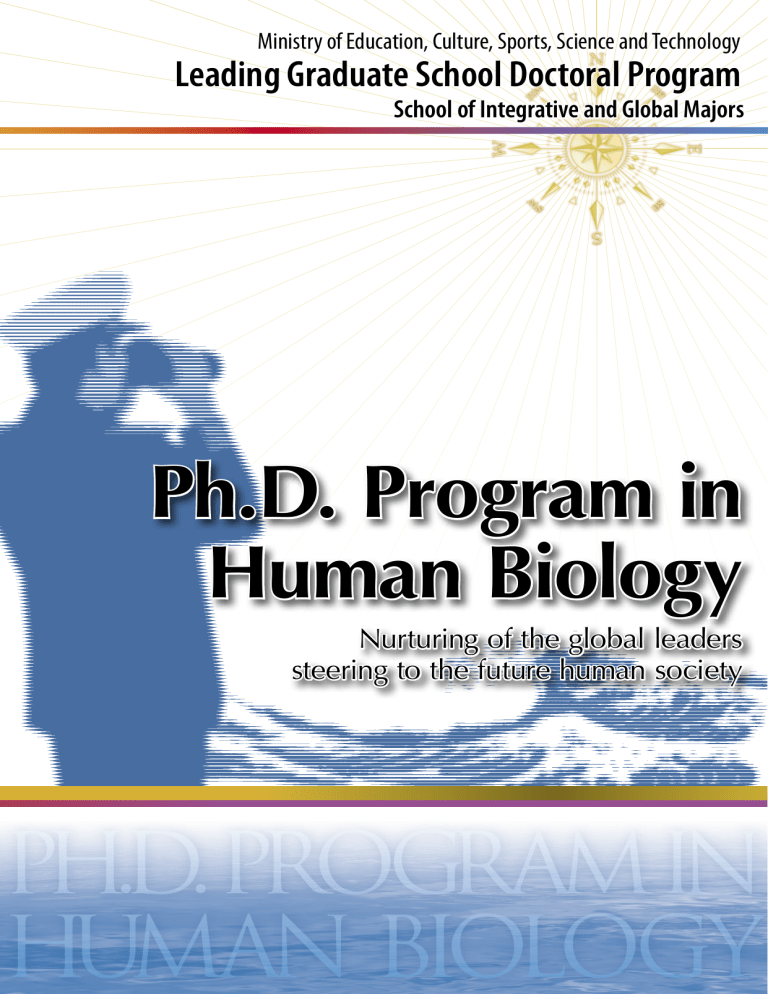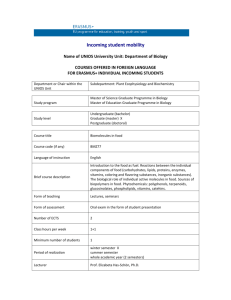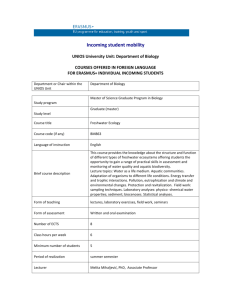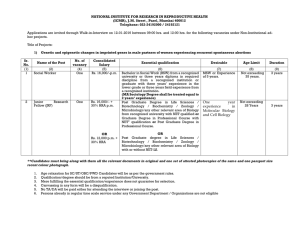Ph.D. Program in Human Biology

Global leaders able to lead the next generation of science & technology
Ministry of Education, Culture, Sports, Science and Technology
Leading Graduate School Doctoral Program
School of Integrative and Global Majors
Ph.D. Program in
Human Biology
Nurturing of the global leaders
steering to the future human society
PH.D. PROGRAM IN
HUMAN BIOLOGY
as a Focal Point of
Knowledge
President of the University of Tsukuba
Nobuhiro Yamada
The University of Tsukuba has a long histor y and tradition.
Seizing the opportunity provided by the relocation to the Tsukuba area of its predecessor, the
Tokyo University of Education, the University of Tsukuba was established in 1973 based on a new educational concept.
The university's history dates back to its founding as a
Normal School (later named Tokyo Higher Normal School) in 1872. We aim to be an open university in every sense.
With its proactive initiatives to create a flexible education and research structure as well as a university system for the needs of the next generation, the University of Tsukuba is now a frontrunner in university reform in Japan. We aspire to be an ideal university, continuously meeting new challenges and developing new areas.
The foremost mission of a university is to provide an environment that allows future leaders to realize their potential in full. The University of Tsukuba gives students the opportunity to develop their individuality and skills through an education that is backed by cutting-edge research. Our goal is to endow students with a rich sense of humanity and a creative intellect, equipping them with the ability of working independently and internationally. In particular, we aim to improve their communication skills, moral values, sense of responsibility, and logical thinking abilities. Each individual student faces the challenge of acquiring independent thinking and imagination, how to communicate and familiarize themselves with new concepts. We are determined to develop their creativity and ability of identifying and solving problems to the highest level.
With its quiet suburban setting removed from the bustle of
Tokyo, our campus has an abundant natural environment that is attractive to students and faculty alike. It is an environment in which they can develop their strengths through reflection and discussion. It also hosts a highly diverse student body, both domestically and internationally. With the second largest number of international students among Japan's national universities, and having been chosen as a Core University for Internationalization through the Global 30 Project, the
University of Tsukuba has developed into a university of international flavor and diverse values.
As a comprehensive university with a wide range of academic fields, we are actively expanding interdisciplinary and integrative approaches to education and research while furthering specialized expertise. Owing to the wide dissemination of research outcomes, we have achieved a reputation as a base for international research and education.
Three Nobel Prize winners are connected to our University,
Dr. Sin-Itiro Tomonaga (Nobel Prize in Physics, 1965), Dr. Leo
Esaki (Nobel Prize in Physics, 1973) and Dr. Hideki Shirakawa
(Nobel Prize in Chemistry, 2000). This year marks the 150th anniversary of the birth of Jigoro Kano, who not only acted as principal of the Tokyo Higher Normal School for 23 years, but also enlightened the teaching of Judo as well as literary and martial arts throughout Japan. Many young athletes from our university have participated in the Olympics and brought home gold medals.
Universities are expected to act as a focal point of knowledge that holds the key to a balanced development of human society. Besides education and research, a further essential role of universities is to serve society through international and local contributions, and advance collaboration among industry, academia, and government. At the core of Tsukuba
Science City with its concentration of scientific research institutes, we are at the forefront of such collaboration, and have been actively contributing to society as a whole while continuing to strengthen our education and research. Ours is a rapidly globalizing world where information travels the world in an instant. Some feel uneasy by the sheer pace of change, but times of change are also times of opportunity.
We must foster the kind of imaginative power that can create added value for the future. Imagine the Future is our logo, symbolizing the forward-looking stance of the University of
Tsukuba and its human resources.
Recently, the Ph.D. Program in Human Biology was accepted as one of the Leading Graduate School Doctoral Programs supported by the Ministry of Education, Culture, Sports,
Science and Technology (MEXT), Japan. The promotion of this program leads the traditional university education system to the degree program system in our university as well as universities in Japan. To this end, our university lends intensive support to this program.
School of Integrative and Global Majors
Head of School of Integrative and
Global Majors, Vice President,
University of Tsukuba
Prof.Dr.Kazuhiko Shimizu
As part of our higher education reforms, the University of Tsukuba has launched a series of degree program reforms with the aim
of ensuring the quality of academic degrees awarded.
Focusing on student learning outcomes, these degree programs imply systematically designed education programs which enable students to clarify and gain their academic competences in accordance with their area of study and level of university degree, such as bachelor’s, master’s, doctoral, and professional. In order to transform the existing university-centered to student-centered degree programs, the
University is currently formulating three academic policies, including those for degree granting, curricular organization, and admission for undergraduate and graduate programs.
Furthermore, in keeping with the establishment idea of our university, it is one of the most important missions for our university to develop and create interdisciplinary degree programs. In order to promote the interdisciplinary degree program, we have established School of Integrative and
Global Majors (SIGMA), headed by the Vice President responsible for the education system. The function of the
School is to support the management of degree programs and other educational programs and thereby promote the education by the programs under the School.
The Ph.D. Program in Human Biology was accepted to the
Leading Graduate School Doctoral Program supported by the Ministry of Education, Culture, Sports, Science and Technology (MEXT), Japan. By combining top-tier national and international instructors and students with academic, business, and governmental circles, this degree program aims to develop graduate level education that is commensurate with higher education institutions ensuring world-class standards of education. Beginning with the Ph.D.
Program in Human Biology, SIGMA aspires to further develop the degree programs at the University of Tsukuba and take leadership roles in higher education reforms both nationally and internationally. Your continuing support and cooperation with the University is greatly appreciated.
In Human biology
Chair of the PhD Program in Human Biology
Prof.Dr.Kyosuke Nagata
What is ‘Human Biology’? Human biology is a new area of study in biology. In human biology, a human being is relativized to other living organisms as one species on this planet in the universe, and as one species born in the time-axis of biological evolution. Human biology is the area of study to understand the maintenance mechanism of the homeostasis, and the inheritance mechanism of successive life in variable
The Human Biology Ph.D. Program
The captain training program which makes the society which lives with the humans appropriate for a person circumstance and thereby to contribute to formation of the unstinted human society and the sustainable world.
Human biology is categorized into biology, but not medicine.
However, medical knowledge and concept are important for human biology. We have realized that the college students majored in biology and medicine do not sufficiently study the mathematical science (i.e., mathematics, physics, chemistry, etc.) during their high school days, or in a university general education curriculum, which is truly helpful for subsequent learning. A fundamental problem for human science is lack of experimental test systems for human beings. Although an animal is naturally used as an alternative experiment medium, is the result applicable to humans as well? When we consider development of a new medication as the example, this shall be the case. Here in our Ph.D. Program in Human
Biology, we will integrate the knowledge acquired in medical science with the result obtained from the life science research using animals and cells; use the concept and methods of the mathematical science; and simulate biological processes in computers using the latest computing science. In cooperation with a wide range of interdisciplinary approaches, we will try to reproduce human beings in virtual space and use them to further develop technological application.
Science pursues to generalize the principle in the nature fact, while technology can prove the correctness of the principle by appropriate application. Those who are responsible for the future world with science and technology shall expand and deepen science academically; create new technology based on the knowledge acquired in learning and give it back it to the human community; and coordinate to tie science and technology with the society. In our human biology degree program, we have prepared the curricula which make these various careers possible. For example, we offer subjects relevant to International Research Rotation, Entrepreneurship
Trial, Appropriate Technology Program, and so forth.
We designate our program as the "Shipmaster Program”, alternatively. The shipmaster of present-day fisherman convoy as well as one in Great Navigation Age should have not only the professional skill, including the helmsmanship based on information obtained by GPS and a mariner’s compass, but also the skill for "cognoscente", "breakthrough", and "accomplishment" to for correct navigation performances for their ultimate targets and objects.
Now, let's set sail! See the world with friends having diverse backgrounds and cultures.
The Human Biology Ph.D. Program
Humankind invented science and technology, and in doing so unwittingly exposed its health and wellbeing to a great deal of threats. Today, our global environment is deteriorating, as the delicate balance of its water and atmospheric systems becomes polluted; within this increasingly precarious environment are chemical substances, such as endocrine-disrupting chemicals, the byproduct of the technological inventions of humankind.
Elsewhere, the spread of new and re-emerging infectious diseases is a result of the high speed at which people and items travel the world today. In order to control this kind of global threat, we cannot rely on medicine alone, the primary aim of which is to prevent and to heal disease.
Rather, we must combine multiple related disciplines, starting with the field of biology. When carrying out research on the human being, there are ethical boundaries that dictate which experimental methods are considered acceptable, and thus collaboration and integration with computational science is required to apply biological findings to the human being.
1 Entrance examination reform: ensure intake of outstanding students by referring to internationally standardized GRE/GPA results and introducing an examination process involving overnight stays and informal interaction.
2 Globalization as the norm: promote the establishment of an environment that encourages both Japanese and international students to learn and study in English, and make use of the opportunities presented by the largest dormitory facilities in Japan to encourage mutual cultural interaction and understanding.
3 Graduate school education encompassing science and liberal arts: nurture students through a program of integrated knowledge and learning, encouraging them to acquire the ethical outlook, internationally-oriented open-mindedness, and globally-translatable negotiating skills that are the standard of the University of Tsukuba’s Graduate School, and harnessing the opportunities presented by the cooperation of world-leading scientific researchers and corporate managers to encourage further learning and debate, and to motivate students to play a full role in society.
4 Developing breakthrough power to facilitate international cooperation and good judgment applicable to industrial contexts: entrepreneurships, appropriate technology learning, overseas laboratory rotations, overseas corporate internships, corporate planning & development competitions, and project management are all incorporated into the program. Students are able to choose courses according to their own personal goals, and build up appropriate judgment applicable to broad social situations including industrial contexts and government bodies, as well as the ability to make breakthroughs that will lead to enhanced international cooperation. The performance of students in these two areas will be measured in the
Qualifying Examination.
The Human Biology Ph.D. Program will implement the following measures with regard to innovation in administration, curriculum, and diploma systems within the program.
President
School of Integrative and Global Majors
1
HUMAN BIOLOGY Ph.D. PROGRAM
Entrance examination reform
Entrance examination :First round based on GRE, GPA scores;
Second round on a selection camp
Medicine
3
Graduate school education Ethics, international negotiating skills etc.
2
4
Japanese & International students living together & promoting mutual cultural understanding
Overseas Partner Universities
15 countries
25 universities
Edindurgh University
Harvard University, etc
Computational
Science
Human
Biology
Material
Science
5
Partner companies
15 companies
Astellas, Ajinomoto, Japan
Chemical Industry Association, etc.
Biological
Science
on specialist knowledge and skill
Expertise in human biology comparative to that of a medical doctor Ability to provide solutions and take conclusive action based on specialist skills rooted in an integrated understanding of and expertise in biological science, computational science, material science
-1 Breakthrough power to facilitate international cooperation
Entrepreneurship
Appropriate technology education
Internships in overseas companies
Rotation in overseas research laboratories
4
-2 Good judgment applicable to industrial contexts
University-based commercial laboratories Corporate planning
& development competitions
Project management
Qualifying Exam
(diploma policy) based on industry standards
Good judgment, breakthrough power, specialist skills, adility to take conclusive action
6
Internationalization of faculty
Supervision by faculty of multiple nationalities and multiple disciplines
Faculty evaluative system
Operating Committee
Planning Committee, Educational Affairs Committee,
FD/SD Committee, international Partnerships Committee,
Corporate Relations Committee, Public Relations Committee
Output Outcome
Extemal Evaluation Committee
Alumni Network
Human resources able to promote the evaluation of the adverse effects of chemical substances arising from human activity, including medicine, pharmacology, agriculture and engineering, on human health and well-being.
Tsukuba Innovation Arena for life
University of Tsukuba/
Human Biology Ph.D. Program
Independent Administrative
Institution Research Laboratories
National Institute of Advanced
Industrial Science and Technology
National Institute for Materials Science
Private corporations
Astellas
Eisai
Intel
Nurturing of the global leaders steering to the future human society
Extemal Evaluation Committee
Alumni Network
Human resources able to promote the evaluation of the adverse effects of chemical substances arising from human activity, including medicine, pharmacology, agriculture and engineering, on human health and well-being.
President
Output
Educational Goals of the Program
The Human Biology Ph.D. Program adopts a multi-perspective methodological approach, integrating the disciplines of biological science, medicine, computational science, and materials science, to understand the mechanisms of human survival, adaptation, and
School of Integrative and Global Majors
1
HUMAN BIOLOGY Ph.D. PROGRAM
Entrance examination reform
Entrance examination :First round based on GRE, GPA scores;
Second round on a selection camp
Medicine
3
Graduate school education Ethics, international negotiating skills etc.
2
4
Japanese & International students living together & promoting mutual cultural understanding
Overseas Partner Universities
15 countries
25 universities
Edindurgh University
Harvard University, etc
Computational
Science
Human
Biology
Material
Science
5
Partner companies
15 companies
Astellas, Ajinomoto, Japan
Chemical Industry Association, etc.
Biological
Science
on specialist knowledge and skill
Expertise in human biology comparative to that of a medical doctor Ability to provide solutions and take conclusive action based on specialist skills rooted in an integrated understanding of and expertise in biological science, computational science, material science
-1 Breakthrough power to facilitate international cooperation
Entrepreneurship
Appropriate technology education
Internships in overseas companies
Rotation in overseas research laboratories
4
-2 Good judgment applicable to industrial contexts
University-based commercial laboratories Corporate planning
& development competitions
Project management
Qualifying Exam
(diploma policy) based on industry standards
Good judgment, breakthrough power, specialist skills, adility to take conclusive action
6
Internationalization of faculty
Supervision by faculty of multiple nationalities and multiple disciplines
Faculty evaluative system
Operating Committee
Planning Committee, Educational Affairs Committee,
FD/SD Committee, international Partnerships Committee,
Corporate Relations Committee, Public Relations Committee
Outcome
Tsukuba Innovation Arena for life
University of Tsukuba/
Human Biology Ph.D. Program
Independent Administrative
Institution Research Laboratories
National Institute of Advanced
Industrial Science and Technology
National Institute for Materials Science
Private corporations
Astellas
Eisai
Intel inheritance. Students will be given training allowing them to develop the outstanding research skills and specialist knowledge required at this level of study. The aim is to nurture the global leaders of the future, able to create a rich human society.
Matchless Educational Approach
The core concept at the heart of the various unique educational and research approaches that make up this course is a program of individualized, global overseas training, exemplified by appropriate technology learning programs. Through this kind of overseas training program, the Ph.D. Program is able to conduct coursework at partner universities overseas and in collaboration with industry, designed to 1) foster leading researchers with a challenging spirit both for academia and industry, 2) develop leadership skills along with entrepreneurship for desirable organizational management, and 3),develop specialist and social skills based on strategic planning.
The Human Biology Ph.D. Program Graduate
The Human Biology Ph.D. Program graduate will be able to use the skills obtained through the program’s unique educational approach to work toward the development of solutions to those global-scale problems that pose a threat to the health and well-being of humans.
He or she will display the ability to display excellent judgment, make breakthroughs, and take conclusive action, geared toward attaining international consensus.
5 Conclusive action-taking based on specialist knowledge and skill:
Develop the ability to take conclusive action appropriate to one’s position, based on multi-perspective and comprehensive problem-solving skills, traversing medicine, biological science, computational science, and materials science, and based on specialist knowledge in human biology built up through study of specialist courses incorporating project-based learning methods. Participation in joint research projects in laboratories engaged in research in other disciplines, as well as laboratories in overseas institutes, is also used to develop specialist knowledge, research skills, and management ability, as is high-level debate in advanced level entrepreneurship and appropriate technology learning courses, and regular research and practical training.
6 Internationalization of faculty: the graduate education outlined above will only become possible if the supervising faculty members are from multiple countries and from multiple disciplines, and include staff from industry and government as well as academic, able to take an interdisciplinary and international approach to teaching and supervision. In order to achieve this, the Program must ensure that the faculty itself is of an international quality. A Communications and Coordinating Committee will be set up to oversee matters relating to exchange and interaction with overseas partner universities as well as educational guidance policy, and it will also seek to improve teaching skills. The teaching quality of the faculty members will be evaluated via peer reviews from students as well as faculty members who previously worked in industry in order to sharpen up evaluative measures of faculty. When undertaking their teaching duties, faculty should remember the words of Eizaburo Nishibori, captain of Japan’s first Antarctica wintering party in the first half of the twentieth century: “to nurture is to allow students to taste success and to learn from mistakes. The heart that wishes to learn knows no fear, but instead is full of challenge and will venture forth for discovery,”
Outline
The students in the Human Biology Program will be trained in multidisciplinary courses that cover medical, biological, computational and physical sciences, to further understand how human being can adapt, inherit and sustain their life. Students participate in this program shall gain research and scientific knowledge that is expected to become world-class leaders, who could direct our society for the benefit of the human being.
Human Biology
Our Vision for Human Biology Research
Post-Central Dogma
Biomolecules
Epigenetic Molecules
Control
Central Dogma
Sustaining life and health
Translation supervised by Kyosuke Nagata
The biology of the human being
・ Medicine ・ Science ・ Engineering
・ harmacology ・ Agriculture
Human biology transcends conventional disciplinary boundaries,and looks at the human being as a single unit of life on the earth and in the universe, it seeks to examine and understand the mechanisms and homeostasis of the human on the temporal axes of the global environment and biological evolution.
Deductively Understanding the human
Seeking to gain an understanding of the human in the context of both natural and social environments, and contrubute to sustainable wellbeing and happiness on Earth.
Research
Inductively
Wet experiments (biology, medicine, agriculture) identification of molecules, functional analysis
Kazuhiko SHIMIZU Vice President /Doctor of
Philosophy in Education: Educational Systems
Kyosuke NAGATA Professor, Biomedical Sciences,
Graduate School of Comprehensive Human Sciences
Doctor of Pharmacology: Virology, Molecular Biology
Makoto ASASHIMA Director, Life Science Center of
Tsukuba Advanced Research Alliance
Doctor of Science: Developmental/Stem Cell Biology
Yasunori KANAHO Professor, Biomedical
Sciences, Graduate School of Comprehensive Human
Sciences
Doctor of Pharmacology: Physiological Chemistry, Cell
Biology
Mitsuyasu KATO Professor, Biomedical Sciences,
Graduate School of Comprehensive Human Sciences
Doctor of Medicine: Pathology
Satoru TAKAHASHI Professor, Biomedical
Sciences, Graduate School of Comprehensive Human
Sciences
Doctor of Medicine: Developmental Engineering/
Molecular Biology
Kenji IRIE Professor, Biomedical Sciences,
Graduate School of Comprehensive Human Sciences
Doctor of Science: Molecular Cell Biology
Osamu OHNEDA Professor, Biomedical Sciences,
Graduate School of Comprehensive Human Sciences
Doctor of Medicine: Regenerative Medicine/Stem Cell
Biology
Akira SHIBUYA Professor, Biomedical Sciences,
Graduate School of Comprehensive Human Sciences
Doctor of Medicine: Medicine Immunology
Masahi YANAGISAWA Professor, Biomedical
Sciences, Graduate School of Comprehensive
Human Sciences(Funding Program for World-Leading
Innovative R&D on Science and Technology)
Doctor of Medicine : Molecular Pharmacology/
Neuroscience
Hitoshi SHIMANO Professor, Clinical Sciences,
Graduate School of Comprehensive Human Sciences
Doctor of Medicine: Endocrinology
Takayuki SUMIDA Professor, Clinical Sciences,
Graduate School of Comprehensive Human Sciences
Doctor of Medicine: Connective Tissue Disease/
Rheumatology, Clinical Medicine, Immunology
Shigeru CHIBA Professor, Clinical Sciences,
Graduate School of Comprehensive Human
Sciences
Doctor of Medicine: Hematology
Hiroyuki YOSHIKAWA Professor, Clinical
Sciences, Graduate School of Comprehensive Human
Sciences
Doctor of Medicine: Obstetrics and Gynaecology
Tadashi BABA Professor, Life Science and
Bioengineering, Graduate School of Life and
Environmental Sciences Doctor of Agriculture:
Molecular and Development
Akiyoshi FUKAMIZU Professor, Life Science and Bioengineering, Graduate School of Life and
Environmental Sciences
Doctor of Agriculture: Biochemistry/Molecular Biology
Jun YANAGISAWA Professor, Life Science and Bioengineering, Graduate School of Life and
Environmental Sciences Doctor of Pharmacy: Molecular
Biology
Tomoki CHIBA Professor, Biological Sciences,
Graduate School of Life and Environmental
Sciences
Doctor of Medicine: Molecular Cell Biology
Hiroshi WADA Professor, Biological Sciences,
Graduate School of Life and Environmental
Sciences
Doctor of Science: Evolutionary Embryology
Mitsuhisa SATO Professor, Computer Science,
Graduate School of Systems and Information
Engineering
Doctor of Science: Computer Science
Tetsuya SAKURAI Professor, Computer Science,
Graduate School of Systems and Information
Engineering Doctor of Engineering: Numerical Analysis
Shoji MAKINO Professor, Computer Science,
Graduate School of Systems and Information
Engineering
Doctor of Engineering: Media & Information Science
Kazuhiro KAWAMURA Professor, Mathematics,
Graduate School of Pure and Applied Sciences
Doctor of Science: Topology/Combinatorics
Masaki KITA Associate Professor, Chemistry,
Graduate School of Pure and Applied Sciences
Doctor of Science: Bioorganic Chemisty/Natural
Products
Shigeyuki KANO Professor, Medical Sciences,
Graduate School of Comprehensive Human Sciences
(Partner Graduate School)
Doctor of Medicine: Tropical Medicine
Keiji TANAKA Professor, Medical Sciences,
Graduate School of Comprehensive Human Sciences
(Partner Graduate School)
Doctor of Medicine: Biochemistry
Shunsuke ISHII Professor, Medical Sciences,
Graduate School of Comprehensive Human Sciences
(Partner Graduate School)
Doctor of Science: Molecular Biology
Keiji MIYATA Professor, Clinical Sciences, Graduate
School of Comprehensive Human Sciences (Partner
Graduate School) Doctor of Veterinary Medicine:
Translational Science (Pharmacology)
Shintaro NISHIMURA Professor, Clinical Sciences,
Graduate School of Comprehensive Human Sciences
(Partner Graduate School) Doctor of Engineering:
Nuclear Medicine
◇ To be scheduled
Taka-Aki SATO Shimadzu Corporation
Nobuo HANAI Kyowa Hakko Kirin Co., Ltd.
Teizou MURATA Ajinomoto Co. Inc.
Satoshi KAWAMURA Sumitomo Chemical
Takashi NAGATA Mizuho Information & Research
Institute
Yukihiro YADA Kao Corporation
Michael Kann Université Victor Segalen
Bordeaux 2 Professor
Charles ffrench-Constant University of Edinburgh
Professor
Carl-Henrik Heldin The Ludwig Institute for Cancer
Research Uppsala University Professor
Ricardo E. Dolmetsch Stanford University
Associate professor
Alfred Goldberg Harvard University Professor
Lewis L. Lanier University of California, San
Francisco Professor
Kei Shinkai Tsinghua University Professor
Ding Shih-Torng National Taiwan University
Professor
Kim, Seong-Jin CHA University Professor
Sue Goo Rhee Ewha Womans University
Professor
Curriculum
This Program provides not only specialized subjects on life science, medical science, pure and applied sciences, and computational science but also Transferable Skills, subjects offered by companies, International Research Work,
International Mushashugyo, etc. to understand the mechanisms of human survival, adaptation, and inheritance. Students will be given training allowing them to develop the outstanding research skills with specialist knowledge. The aim is to nurture the global leaders of the future who can contribute to creation of the next-generation human society.
1st year
Basic Experiments in Human Biology
Special Lectures in Human Biology I
Special Seminars in Human Biology I
Special Research in Human Biology I
International Subjects
Initiation Seminar
World Science Leaders' Seminar
Business Leaders' Seminar
Experimental Sciences
Serendipity in Human Biology
Transferable Skills *
International Business Negotiation
Intellectual Properrty Right
TOEFL iBT
Mathematics & Computer Science
Application of Information
Technology in Science
Basic Computational Biology
High Performance Computing Technology
Computational Algorithms
Mathematics for Biology
Molecular Subjects
Biochemistry & Molecular Biology
Molecular Cell Biology
Pharmacology, Basic Toxicology
Human Chemical Biology
Frontier Science in Drug Discovery
Medical Subjects
Human Anatomy & Embryology
Human Pathology & Oncology
Human Infection & Immunology
Human Endocrinology & Metabolism
Environmental Medicine
Common Subjects
CITI:Required Education for Human Research Participants
Human Biology Communication I, II
International Discussion on Human Biology I, II
2st year
Special Lectures inHuman Biology Ⅱ
Special Seminars inHuman Biology Ⅱ
Special Research inHuman Biology Ⅱ
Special Practice inHuman Biology Ⅱ
* Graduate Schools
Common Subjects
Study Subjects
Advanced Specialized Subjects
Gene Engineering
Reproduction biology
Epigenome Physiology
Signal Transduction and Drug Design
Stem Cell Therapy
Analysis Machineries in Human Design
Exposure Science and Toxicology
Common Subjects
Research Presentation and Discussion
Internal Research Rotation
Internship in Overseas Companies
Appropriate Technology
Entrepreneurship
Home Internship
3st-5st years
Advanced International Research Rotation
Advanced Internship in Overseas
Companies
Advanced Appropriate Technology
Advanced Entrepreneurship
Thesis Work
4th year
Summer Camp
Mid-term
Evaluation
End of Second Year
Qualifying Exam.
60 Credits
GPA > 3.0
Final Exam.
End of 4th Year
Qualifying Exam.
72 Credits
GPA > 3.0
TOEFLiBT > 90
TOEIC > 860
Student Support
・
Career Paths
Here in the University of Tsukuba, we are very seriously thinking of the student service including their financial support as well as career employment support.
Student
Support
・ Financial support (JPY 2,160,000~2,880,000 /year,including school expenses)
・ Support for overseas activities (JPY 1,000,000 average)
Overseas lab rotation, Overseas internship and research, Appropriate technology education
・ Preferential availability of dormitories (personal expense: JPY 30,000/month)
・ Risk, mental health and career support
Career
Paths
Current Conditions and Problems
Universities, Incorporated Administrative Research
Institutes, Industries
・ must clarify career paths for degree holders
・ must ensure fair competition because personnel
change is infrequent
・ must meet the needs of the global community
・ must overcome shortages of talented people who are necessary for success in international competition
Graduate Students
・ tend to stay in their own country, hesitate to go
overseas to study
・ are unaware of the diversity of types of jobs
University Faculty
・ are less conscious about students’career paths
Countermeasure
Suggestions for the Career Path Plan obtained from degree program participating institutions both at home and abroad
・ clarify recruitment and training processes in each
institution and industry
・ educate about and promote starting a company
Furthermore, creation of the field of new growth industry
Graduate Students’ study
・ learn on the world stage
・ internships in company collaboration laboratories
Structure of quality guarantee of teachers
・ International Peer Review aiming at educational power
and qualitative improvement
Global leaders able to lead the next generation of science & technology
A captain should have not only the “Professional Skill”, including the helmsmanship based on information obtained by GPS and a mariner’s compass, but also the skill for “Cognoscente”,
“Breakthrough”, and “Accomplishment” to correct navigation performances for their ultimate targets and objects.
Captain
Ph.D
. Progr
Cognoscente
Professional Skill
Accomplishment
University of Tsukuba
School of Integrative and Global Majors
1-1-1 Tennodai, Tsukuba, Ibaraki 305-8577 Japan







